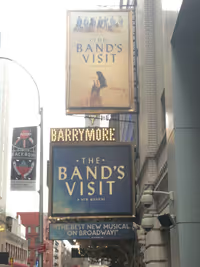Sad to see Honeymoon go...and this disturbing trend
#50Sad to see Honeymoon go...and this disturbing trend
Posted: 4/3/15 at 9:02pm
Ben Brantley is one of the biggest losers. They told him he would have the power of life and death....
Hang in there, Bruce. Roundabout is bringing back <i>She Loves Me</i> this season with Laura Benanti.
Recent Times article pegged the price of a Broadway show today to almost three times the price of the 70s. Adjusted for inflation, that is. Price is of course important. A nice musical like <i>On the Town</i> with good cast and great creative, maybe doing less than their best, for twenty bucks could afford to see the show and pronounce it as "pleasant." For twenty bucks it could beat out a lot of films and TV series.
Now, to justify a hundred and forty dollars, you want to see something blockbuster or to see a star-vehicle. Did Cabaret take off when Emma Stone popped into town. I don't see this changing unless (or until) the next great financial disaster hit the country and Broadway sees that it is pricing itself out of existence.
#51Sad to see Honeymoon go...and this disturbing trend
Posted: 4/3/15 at 9:50pm
OlBlueeyes-
That's a nice theory, but it doesn't hold up under analysis.
As the saying goes, if folks don't wanna see a show, you can't pay them to go to it. It has always been thus, in the 70s, in the 50s, in the 30s. And that, for better or worse, is the story of this show. If it were high prices that killed it, then explain why the show could not dispose of tickets at any price, or even when they papered? Yes, current prices are high, but what we know is that when people want to see a show, they pay it. And when they really want to see it, they pay more even than the producers are charging for the tickets. That's what we call a market driven by supply and demand. And it is not true that it is only star vehicles and blockbusters that people will pay for. There are over a dozen musicals currently running (not counting the new ones that are likely to follow in their path) most of which lack both stars and blockbuster status. But people want to see them. And there are shows people don't want to see, and they do as they have always done: they close so someone else can take a shot.
What is the rationale for your theory? That shows people don't want to see should be propped up? That sounds like an invitation to mediocrity, and that has never been a very good approach to making theatre.
One more thing: your inflation stats are all wet. A $20 ticket in 1975 dollars is $87.26 today. A $20 ticket today would have been $4.58 in 1975. Why would anyone produce a show under those circumstances? They wouldn't: it's a pipedream. Honeymoon, with an avg ticket price of less than $65 (that's under $15 in 1975) has had a weekly shortfall each week of almost 50%. (OTT, only marginally better). On what planet would this ever happen?
Updated On: 4/3/15 at 09:50 PM
Julie Yard
Stand-by Joined: 8/29/13
#52Sad to see Honeymoon go...and this disturbing trend
Posted: 4/4/15 at 12:46am
Just to add to the discussion... I read this afternoon that the folks behind Matilde are working on a musical of Groundhog Day; and like all such movie to musicals (HIV, BOMC, Rocky, etal) my reaction was Blech! That said, I did see BOMC, I think I went because of Kelli O'Hara and I loved it and saw it twice. When it closed I wondered if it had been tweaked not to mirror that book/movie if it would have had a longer run. Who needs to read the book, see the movie and see the play? (and in the case of all those movies ... they've run ad nauseum on TBS)!
#53Sad to see Honeymoon go...and this disturbing trend
Posted: 4/4/15 at 8:04am
Not that many years ago producers were a lot smarter. If a show was not selling or reviews were bad they would pull the plug ASAP. This trend of putting more and more money into a show that isn't selling well is bizarre to me.
#54Sad to see Honeymoon go...and this disturbing trend
Posted: 4/4/15 at 8:13am
And when shows close incredibly fast, we argue that they never gave the show a chance to find its audience. I certainly felt that way about Scottsboro Boys. Gentleman's Guide held on to success. So what is the magic formula? There isn't one.
Do I think it's ridiculous how long Vegas held on? Yes, but it's not my money.
#55Sad to see Honeymoon go...and this disturbing trend
Posted: 4/4/15 at 10:06am
Hogan,
Just found my old ticket for a center front mezz seat to Cats (Sat. matinee in 1983, when it was the hottest ticket on Broadway). Cost $37.50. The exact same seat for Wolf Hall at tonight's show (Sat. matinee in 2015) is $147.50! Just under 4 times the price. Looks like I got a slightly better deal than your $20/$87.26 example! :)
#56Sad to see Honeymoon go...and this disturbing trend
Posted: 4/4/15 at 2:03pm
You have a very novel way of adjusting for inflation. You take the price from 1975, adjust it for inflation in 2015, then adjust the 1975 price back down using the 1975 inflation rate.
The old casual method would take the early date, in my article 1966 with a top price of 12 dollars that year and, adjusting for inflation, would find the equivalent top price in 1992 to have been $41.50. Instead the top price in my article, 1992, was $60.00.
The difference between $60 and $41.50 is all price increase to the producer. And since 1992 we've had a lot more inflation and the price differential would be even greater.
http://www.nytimes.com/1992/01/26/theater/l-ticket-prices-inflation-is-one-thing-179092.html
"As the saying goes, if folks don't wanna see a show, you can't pay them to go to it. "
As an insider, you do not take into account the tourists and the suburbanites and even the Manhattan population, good for maybe three shows a year, whose lives are not centered around Broadway. They want to have those nice paid-for cardboard tickets in their hands. They want good seats and will pay for them if they are not regulars. They no nothing about "papering" as I knew nothing up it until I saw the term used. But I still have to idea on how to get "papered." And neither would a great majority of casual theatergoers. And the only thing they know about the intricate discount maze are the bright pamphlets they get in the mail.
"Yes, current prices are high, but what we know is that when people want to see a show, they pay it."
You got me here. A young family, just starting to save for the children's education, is going to lay out 400 dollars so the parents can have a night on the town. And if they only had to pay 250 dollars it would not affect their decision on whether to go. I know which way I lean on the subject, but have no proof.
"And it is not true that it is only star vehicles and blockbusters that people will pay for."
I make this statement not in general but to the theatergoers that I've described above. Most tourists or suburbanites or casual attendees who take in a show two or three times a year could not name one Off-Broadway show. The local enthusiasts, which are many in Manhattan, can support the low profile show, and they do, but usually not for long as I believe you said one in four or five close at a loss to those who put up the money.
My point was simply to agree that if ticket prices for Broadway shows were less, the number of people attending the shows would be greater. Controversial?
Updated On: 4/4/15 at 02:03 PM
ZannaDo
Stand-by Joined: 12/1/14
#57Sad to see Honeymoon go...and this disturbing trend
Posted: 4/4/15 at 2:37pm
How is Honeymoon in Vegas closing a bad sign for theatre? Yes, it is offensive to a lot of people and that shouldn't be sneered at. You don't get to decide what other people are offended by. Honestly, it also just relies on a lot of lazy, stereotype based comedy. We KNOW JRB is capable of smarter humor and more original tunes, but there's none of that here. It's based on a cheesy movie, it stars a B-List "celebrity"...these aren't really the things that I mourn losing on Broadway. We need more original musics, we need more creative shows that are outside the box. You say Broadway hasn't had a bonafide hit in awhile, but Hamilton is a brand new, original show that's selling tickets like crazy. There's plenty to celebrate this season and next. I understand it sucks when a show you like closes, but this wasn't really some revolutionary piece that's going before it's time.
#58Sad to see Honeymoon go...and this disturbing trend
Posted: 4/4/15 at 2:43pm
If we haven't had a bonafide hit since The Book of Mormon, then what category would hits like Kinky Boots, Beautiful: The Carole King Musical, and Aladdin fall into?
Seperite
Understudy Joined: 12/22/14
#59Sad to see Honeymoon go...and this disturbing trend
Posted: 4/5/15 at 9:23pm
Kinky Boots and Aladdin may well turn out to be mega-hits (grossing 1 - 1.5 million a week 1 - 2 years after opening is impressive.) Beautiful, however, does not "count" (and neither, for that matter, does Bullets over Broadway.) The point of the original post was to lament how difficult it has become for a *new musical* to survive in the venue that invented musicals. By "new musical," I mean one with an original score -- not a straight play, not a revival, and not a jukebox musical whose music consists solely of tried and true pop/rock hits.
Under that definition, 10 "new musicals" opened in the 2013 - 2014 and 2014 - 2015 seasons (not counting those that only begun previews in the past few weeks) and of those ten, only two (Aladdin and GGLAM) are still running. None of the other 8 that have opened and closed (First Date, Soul Doctor, Big Fish, Bridges of Madison County, Rocky, If/Then, Last Ship, Honeymoon) recouped, and since the producers elected to close them before they turned a profit, it follows that the producers decided that they probably never would. When investments prove to perform less well than hoped when they first started writing checks, investors become more skittish about investing in such projects in the future. Ditto composers, who may well turn to other media -- like movies, television, or video games -- to showcase their talents than a medium where the vast majority of works that make it to the pinnacle of professional success actually fail.
This is something that all of us who are fans of musical theater -- not merely fans of Honeymoon -- should lament. When 80% of the few works deemed worthy of millions of dollars of investment fail, it makes it all the more unlikely that such experiments will be tried in the future. So we, as a theater-going audience, can expect producers to make more "safe" choices in the future -- more revivals, more movie-star headlined plays, and more jukebox musicals, and fewer and fewer new, original musicals in the medium that invented new and original musicals. It's sad.
#60Sad to see Honeymoon go...and this disturbing trend
Posted: 4/5/15 at 10:26pm
But those stats are nothing new. At all.
The reason people didn't want to see this has NOTHING to do with whether it has an original score or not. audiences didn't want to see IT. They didn't want to see The Scottsboro Boys, either -- one of my favorite shows of all time.
Frankly,more folks around here seem to care about original stories just as much, if not more than, original scores.
People have been crying about the death if Broadway FOREVER.
#61Sad to see Honeymoon go...and this disturbing trend
Posted: 4/5/15 at 10:58pm
If a musical came from a book or a film or a songbook, I don't care about that, I mainly care about the finished product.
#62Sad to see Honeymoon go...and this disturbing trend
Posted: 4/5/15 at 11:09pm
Why does a musical get a pass if it's based on a movie but not if it uses a catalog of songs as its inspiration? You can't argue that jukebox musicals succeed solely based on their music- if that were the case, Good Vibrations and The Times They Are a-Changin' would both be still running, since they used the very popular music of The Beach Boys and Bob Dylan, respectively. It's hard for ANY show to succeed on Broadway- prior to The Book of Mormon, the last long-running hit to open was Jersey Boys in 2005.
The closing of Honeymoon in Vegas means nothing dire for the fate of musical theatre. It's a show that got lukewarm reviews and clearly had poor word of mouth- shows like that have rarely survived on Broadway, why should this one be any different?
#63Sad to see Honeymoon go...and this disturbing trend
Posted: 4/5/15 at 11:18pm
^What are you talking about? Honeymoon in Vegas got some very glowing reviews!
#64Sad to see Honeymoon go...and this disturbing trend
Posted: 4/5/15 at 11:22pm
"It's a show that got lukewarm reviews and clearly had poor word of mouth- shows like that have rarely survived on Broadway, why should this one be any different?"
You mean it got rave reviews. I don't really know if word of mouth killed this show entirely. Many people have said that they loved the show. I just think it didn't survive because people went "a tacky show about Vegas, I don't think so."
The reason this show should be different is because it is actually a really fantastic show that didn't get its just deserts. There are many shows that close prematurely that are great, and deserve so much more.
#65Sad to see Honeymoon go...and this disturbing trend
Posted: 4/5/15 at 11:28pm
Not sure why but just saw a commercial for Honeymoon on NBC, I guess the ad time is still playing out.
#66Sad to see Honeymoon go...and this disturbing trend
Posted: 4/5/15 at 11:30pm
Maybe lukewarm wasn't the best word, but beyond the Times rave and a few others, the reviews were mixed- it's not as if the show was acclaimed to Book of Mormon levels.
#67Sad to see Honeymoon go...and this disturbing trend
Posted: 4/5/15 at 11:53pm
Most of my adult life I've heard a rough benchmark that only 1/4 Broadway productions recoup. If 2 out of 10 in your selection did, that may seem like underachieving; but consider that if only one of those 8 had gone the other, 3 out of 10 would be just as much an overachievement relative to a 1/4 benchmark.
Besides, of those 8, in my opinion only two had good scores (BRIDGES and LAST SHIP), two had impressive productions (ROCKY and LAST SHIP), and two had standout performances (the BRIDGES leads and Zachary Levi in FIRST DATE.) Five of them I outright wouldn't have produced myself without major revisions (FIRST DATE, SOUL DOCTOR, BIG FISH, IF/THEN and HONEYMOON.)
You can learn any lesson you want from whatever sample you pull. But unless you compare your sample with a control group (say, the context of Broadway history and a rough benchmark of how many hits to expect), you are flailing blind.
#68Sad to see Honeymoon go...and this disturbing trend
Posted: 4/6/15 at 12:09am
I don't really think theres anyway to predict what show will hit. Even catch me if you can with nice reviews and based on a very popular movie, with the whole team from Hairspray, was a flop.
#69Sad to see Honeymoon go...and this disturbing trend
Posted: 4/6/15 at 12:13am
CATCH ME got moderate-to-poor reviews and was based on a film that wouldn't make anybody's list of Top 5 Most Popular Films for either Hanks, DiCaprio or Spielberg. Maybe even Top 10s. And I say that as a big admirer of that film.
#70Sad to see Honeymoon go...and this disturbing trend
Posted: 4/6/15 at 12:27am
"and was based on a film that wouldn't make anybody's list of Top 5 Most Popular Films for either Hanks, DiCaprio or Spielberg. Maybe even Top 10s."
The movie was a huge hit and got uniformly great reviews as well as receiving multiple Oscar nominations and was also a big success at the box office. Not every movie can be E.T.
From Wikipedia: Catch Me If You Can was released on December 25, 2002, earning slightly above $30 million in 3,225 theaters during its opening weekend. The film went on to gross $164.6 million in North America and $187.5 million in foreign countries, coming at a worldwide total of $352.1 million. The film was a financial success, recouping the $52 million budget six times over. Catch Me If You Can was the eleventh highest grossing film of 2002. Based on 194 reviews collected by Rotten Tomatoes, 96% of reviews were positive. Metacritic collected an average score of 76, based on 38 reviews.
Updated On: 4/6/15 at 12:27 AM
#71Sad to see Honeymoon go...and this disturbing trend
Posted: 4/6/15 at 12:33am
I'm not saying that film wasn't popular. It obviously was. But "very popular?" in the words of the inimitable Phillypinto. I would contest that. Again, as an admirer of the film.
But that's besides the main point, here, which is: "this disturbing trend" being referenced has more than likely been with us the majority of the modern Broadway Musical's existence. Carry on.
#72Sad to see Honeymoon go...and this disturbing trend
Posted: 4/6/15 at 12:36am
"But that's besides the main point, here, which is: "this disturbing trend" being referenced has more than likely been with us the majority of the modern Broadway Musical's existence. Carry on."
I think all of us, with the obvious exception of the OP agree about that.
ZannaDo
Stand-by Joined: 12/1/14
#73Sad to see Honeymoon go...and this disturbing trend
Posted: 4/6/15 at 12:57am
Honeymoon isn't an original musical. It's an adaptation of an incredibly commercial property. It's closing signals nothing about the future of theatre, beyond that nobody wants to buy tickets to hear dated jokes that were barely funny the first time around onscreen. Also, yes, it got wonderful reviews, but there were also several reviews that mentioned the out of touch humor, latent sexism, and racial insensitivity that many on this board, Twitter, and the web have noticed too. Word of mouth is as important as reviews, if not more, and on this show, it was pretty mixed.
There are much better examples of shows that closed "before their time" and why is a discussion worth having, but this is really not the poster show for that conversation. Also, sorry, Jukebox musicals do "count". Motown just closed after barely recouping and there couldn't be a more well known catalogue of songs on Broadway, and known to a generation that is in the key demographic of people who buy tickets to shows.
#74Sad to see Honeymoon go...and this disturbing trend
Posted: 4/6/15 at 1:29am
Blue Eyes-Just getting back to you after chasing bunnies for a couple days.Not sure where you are pulling numbers from-I was basing it on your earlier post, but $12 in 1966 is $52 in 1992, and $87 in 2015. Now beyond that, where did you get the idea all of the excess (now $![]() goes to the producer? In fact it goes to pay expenses which are not linear to inflation but much more than inflation. I know it is appealing to say that a show's problems are related to ticket price but as I said at the outset, that doesn't hold up on closer examination.
goes to the producer? In fact it goes to pay expenses which are not linear to inflation but much more than inflation. I know it is appealing to say that a show's problems are related to ticket price but as I said at the outset, that doesn't hold up on closer examination.
Videos









